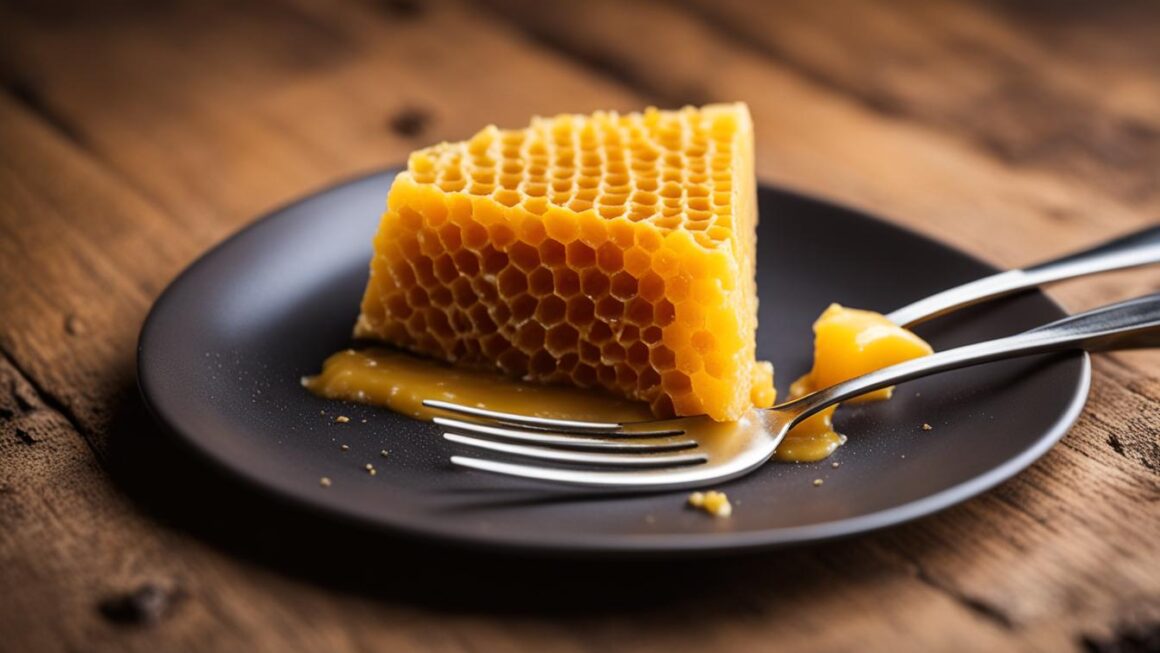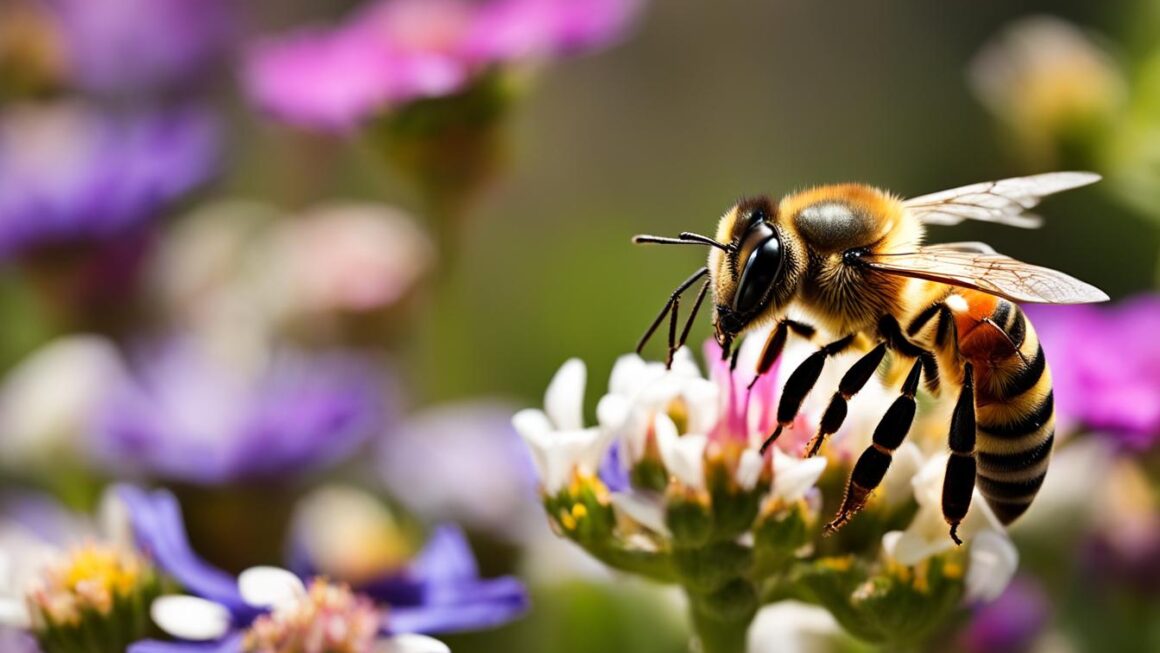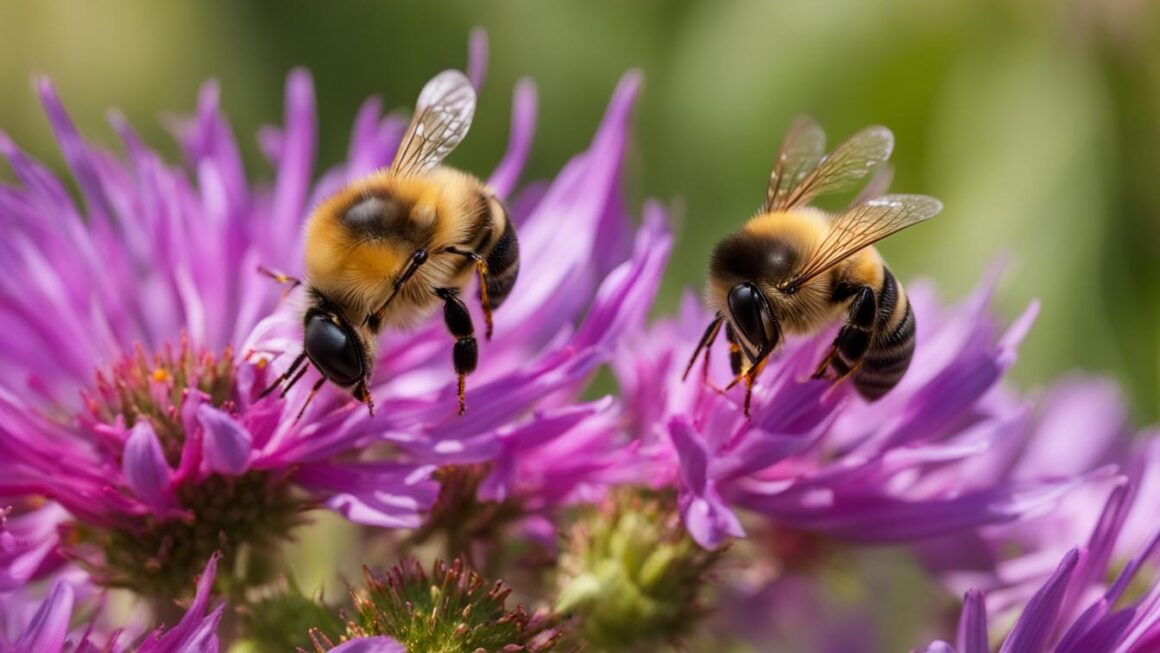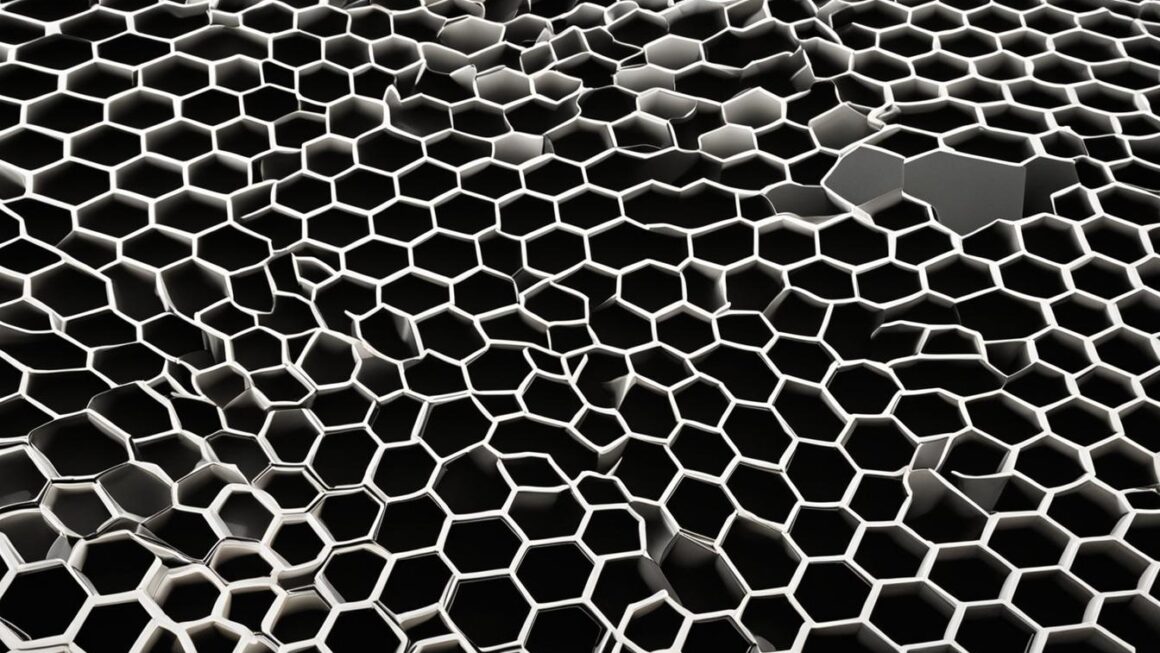Beeswax is a complex substance produced by worker bees and is commonly used in various products such as candles and cosmetics. However, there is a lingering question about its digestibility and its impact on the body. In this article, we will delve into the scientific facts to determine whether beeswax can be digested by humans.
Key Takeaways:
- Beeswax is primarily composed of esters, fatty acids, and hydrocarbons.
- Scientific studies suggest that beeswax has low digestibility in humans.
- Consuming beeswax in moderation is generally safe, but large amounts may cause digestive discomfort.
- Beeswax is not metabolized or absorbed by the body like other nutrients.
- Beeswax is used in traditional medicine and apitherapy for its potential therapeutic effects.
The Composition of Beeswax
Beeswax is a complex substance with a unique chemical makeup that contributes to its various properties and uses. It is primarily composed of esters, fatty acids, and hydrocarbons. These components give beeswax its characteristic texture and make it a versatile material in industries such as cosmetics, pharmaceuticals, and food. Additionally, beeswax contains small amounts of proteins, vitamins, and minerals, which contribute to its nutritional value.
The exact composition of beeswax can vary depending on several factors, including the species of bees and the plants they collect nectar from. Different species of bees may produce beeswax with slightly different proportions of esters, fatty acids, and hydrocarbons. Similarly, the plants that bees forage on can influence the composition of beeswax by contributing different compounds to their diet. This variation in composition adds to the complexity and diversity of beeswax.
Understanding the chemical makeup of beeswax is essential in evaluating its digestibility and its potential effects on the human body. By analyzing the components of beeswax, scientists can gain insights into how it may interact with enzymes and other substances in the digestive system. It also allows for a better understanding of the potential benefits or drawbacks of consuming beeswax.
The Composition of Beeswax
Table: Components of Beeswax
| Component | Percentage |
|---|---|
| Esters | 70-75% |
| Fatty Acids | 12-15% |
| Hydrocarbons | 10-15% |
| Proteins, Vitamins, and Minerals | Trace amounts |
Beeswax is primarily composed of esters, fatty acids, and hydrocarbons. It also contains small amounts of proteins, vitamins, and minerals. The exact composition may vary depending on the bee species and the plants they collect nectar from.
Overall, the composition of beeswax showcases its intricate structure and the diverse range of compounds it contains. This composition plays a vital role in determining its physical properties, as well as its interactions in various applications. Whether it’s used in cosmetics, candles, or other products, the unique composition of beeswax contributes to its versatility and wide range of uses.
Digestive Enzymes and Beeswax Breakdown
Our digestive system relies on enzymes to break down complex substances into simpler forms that can be absorbed by the body. When it comes to beeswax, the breakdown process is dependent on the presence of specific enzymes that can break down its components. Without these enzymes, the digestion of beeswax may be limited.
Beeswax is primarily composed of esters, fatty acids, and hydrocarbons. Its chemical makeup makes it resistant to digestion by our body’s enzymes. The esters in beeswax, for example, require esterases, a specific type of enzyme, to be broken down into their constituent parts. Without these esterases, the esters remain intact, making the digestion of beeswax challenging.
The breakdown of beeswax can also be hindered by the complex structure of its fatty acids and hydrocarbons. These compounds require lipases and other enzymes to cleave the chemical bonds and convert them into smaller compounds that can be absorbed by the intestines. However, the presence and activity of these enzymes can vary among individuals, affecting the overall breakdown and digestion of beeswax.
The Role of Digestive Enzymes in Beeswax Digestion
“The breakdown of beeswax in the digestive system is dependent on the presence of specific enzymes that can break down its components.”
In summary, the digestibility of beeswax is influenced by the presence and activity of specific digestive enzymes. Without these enzymes, beeswax is not easily broken down and digested by the human body. It is important to note that individual variations in enzyme production and activity can affect the digestion process, making it more or less efficient in different individuals.
| Digestive Enzyme | Function |
|---|---|
| Esterases | Break down esters found in beeswax into simpler components |
| Lipases | Cleave fatty acids and hydrocarbons in beeswax into absorbable forms |
Understanding the role of digestive enzymes in beeswax breakdown provides insights into the limited digestibility of beeswax in humans. While it may not be easily broken down by our digestive system, consuming beeswax in moderation is generally considered safe and unlikely to cause any harmful effects. However, individuals with specific digestive conditions or allergies may experience discomfort or adverse reactions, and it is advisable to consult a healthcare professional if any concerns arise.
Studies on Beeswax Digestibility
Scientific research on beeswax digestion has shed light on the challenges our bodies face in breaking down this complex substance. Numerous studies have been conducted to investigate the digestibility of beeswax, providing valuable insights into its impact on the digestive system.
A study published in the Journal of Agricultural and Food Chemistry examined the enzymatic breakdown of beeswax components in vitro. The researchers found that beeswax esters, which make up a significant portion of beeswax, were not easily broken down by digestive enzymes. This suggests that the high ester content in beeswax contributes to its low digestibility in humans.
“The results of our study indicate that beeswax is resistant to digestion by human enzymes. This may explain why beeswax passes through the digestive system largely intact.”
Another study published in the Journal of Food Lipids investigated the digestive fate of beeswax in healthy individuals. The researchers analyzed fecal samples and found traces of beeswax indicating partial digestion and absorption. However, the study also observed significant variations in the extent of beeswax breakdown among participants, suggesting that individual differences in digestion play a role in its digestibility.
While these studies provide valuable insights into beeswax digestibility, it is important to note that further research is needed to fully understand its impact on human health and digestion. The complex nature of beeswax and the variability in digestive processes highlight the need for more comprehensive studies in this area.
| Study | Findings |
|---|---|
| Journal of Agricultural and Food Chemistry | Beeswax esters are resistant to digestion by human enzymes, contributing to low digestibility. |
| Journal of Food Lipids | Traces of partially digested beeswax were found in fecal samples, with variations among individuals. |
The Impact of Consuming Beeswax
Consuming beeswax is generally considered safe and is unlikely to cause any harmful effects in most individuals. However, due to its low digestibility, large amounts of beeswax consumption may lead to digestive discomfort such as bloating or indigestion. It is always recommended to consume beeswax in moderation and listen to your body’s response.
Some individuals may have a higher tolerance for beeswax digestion and may not experience any adverse effects even with larger amounts. However, it is important to be aware of your own body’s reactions and adjust your consumption accordingly.
“While beeswax itself may not provide direct health benefits through digestion, it is often used in combination with other beneficial substances such as honey or propolis.”
Beeswax is commonly used in various natural remedies and products such as balms, salves, and ointments. It is known for its moisturizing and protective properties, making it a popular choice in skincare products. However, the primary benefits of consuming beeswax are often associated with the other substances it may be combined with, rather than its direct impact on the body.
It is worth noting that individual reactions and sensitivities may vary, and some individuals may be more prone to experiencing digestive discomfort or allergic reactions to beeswax. If you have any concerns or pre-existing conditions, it is always best to consult with a healthcare professional before consuming beeswax or products containing beeswax.
| Potential Effects of Consuming Beeswax | Recommendations |
|---|---|
| Bloating and indigestion | Consume beeswax in moderation and listen to your body’s response. |
| Allergic reactions | Consult with a healthcare professional if you have any concerns or pre-existing conditions. |
| No significant health benefits | Look for other natural remedies or products that contain beneficial substances in addition to beeswax. |
Beeswax Metabolism in the Body
Once beeswax is ingested, it undergoes a journey through the digestive system without significant metabolism or absorption by the body. The complex composition of beeswax, including esters, fatty acids, hydrocarbons, proteins, vitamins, and minerals, makes it challenging for the digestive enzymes to break it down effectively. As a result, beeswax passes through the intestines largely intact and is eventually eliminated through bowel movements.
This lack of metabolism and absorption distinguishes beeswax from other nutrients that the body can utilize for energy and nourishment. While the digestive system plays a crucial role in breaking down and assimilating essential nutrients, beeswax remains relatively untouched, offering few direct benefits to the body in terms of metabolism or nutrition.
Beeswax Metabolism in the Body: A Closer Look
The journey of beeswax through the digestive system can be visualized as a process of transit rather than transformation. It enters the gastrointestinal tract and travels through the stomach and small intestine, encountering enzymes that are not specific to its complex structure. Consequently, beeswax remains largely unaffected by the digestive processes that convert most food into usable energy and building blocks for the body.
“Beeswax metabolism is distinct from the body’s processes of metabolizing nutrients. Instead of being broken down and absorbed, it passes through the intestines and is excreted.”
It is worth noting that while beeswax does not contribute directly to the body’s metabolic processes, it plays a vital role in nature. Beeswax serves as a structural component in the construction of honeycombs, providing stability and support for the hive. Additionally, its thermal insulation properties help regulate the temperature within the hive, ensuring the well-being of the bee colony.
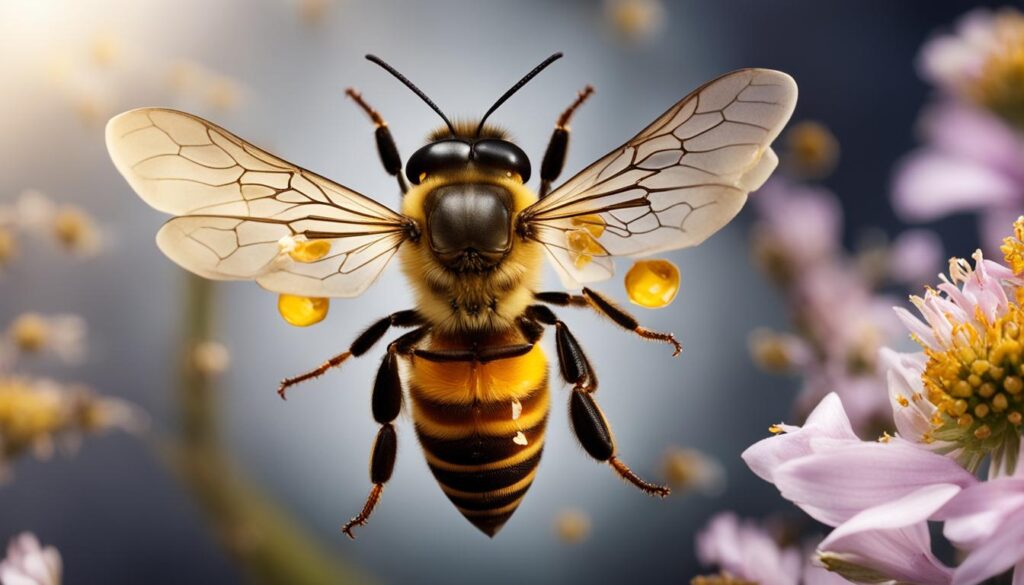
As we explore the digestibility and metabolic aspects of beeswax, it becomes evident that its primary significance lies beyond human consumption. While it may not be substantially metabolized or absorbed by the body, beeswax serves essential functions in the ecological context of honeybees and their hives.
Health Benefits of Beeswax Digestion
While beeswax itself may not provide direct health benefits through digestion, there are potential advantages to consuming it. Beeswax is often used in combination with other beneficial substances such as honey or propolis, and these products have been associated with various health benefits.
One potential advantage of consuming beeswax is its antimicrobial properties. Studies have shown that beeswax has the ability to inhibit the growth of certain bacteria and fungi, making it a natural option for promoting oral health and reducing the risk of infections.
Additionally, beeswax may have anti-inflammatory effects. Research suggests that compounds found in beeswax have the potential to reduce inflammation in the body, which could be beneficial for conditions such as arthritis or inflammatory bowel disease.
It is important to note that more research is needed to fully understand the potential health benefits of beeswax digestion. While these findings are promising, individual responses may vary, and it is always recommended to consult with a healthcare professional before incorporating beeswax or bee products into your diet.
| Health Benefits of Beeswax Digestion |
|---|
| Antimicrobial properties |
| Anti-inflammatory effects |
Beeswax in Traditional Medicine and Apitherapy
Beeswax has a long history of use in traditional medicine and apitherapy. Its unique properties make it a valuable ingredient in various remedies and therapies. In traditional medicine, beeswax is often used topically for its moisturizing and wound-healing properties. It forms a protective barrier on the skin, preventing moisture loss and promoting healing. Beeswax-based ointments and salves are commonly used to soothe dry, chapped skin, and provide relief from conditions such as eczema and psoriasis.
In apitherapy, which is a branch of alternative medicine, beeswax is utilized in combination with other bee products, such as honey and propolis. This holistic approach harnesses the potential therapeutic effects of multiple bee-derived substances. Beeswax may act as a vehicle for delivering these beneficial components to the body or enhance their overall efficacy. However, it is important to note that the use of beeswax in traditional medicine and apitherapy should always be approached with caution and under the guidance of a qualified practitioner.
Beeswax, with its natural healing properties, has been used for centuries in traditional medicine for a variety of purposes. It has been recognized for its ability to promote tissue repair, reduce inflammation, and provide relief from minor skin ailments. However, it is important to remember that the use of beeswax in medical treatments should be supported by scientific evidence and used in conjunction with other appropriate therapies.
In conclusion, beeswax plays a significant role in traditional medicine and apitherapy. Its therapeutic properties have been recognized and utilized for centuries. When used appropriately and under professional guidance, beeswax-based remedies and therapies can provide potential benefits for various health conditions. However, it is always important to approach any form of alternative medicine with caution and seek advice from qualified practitioners.
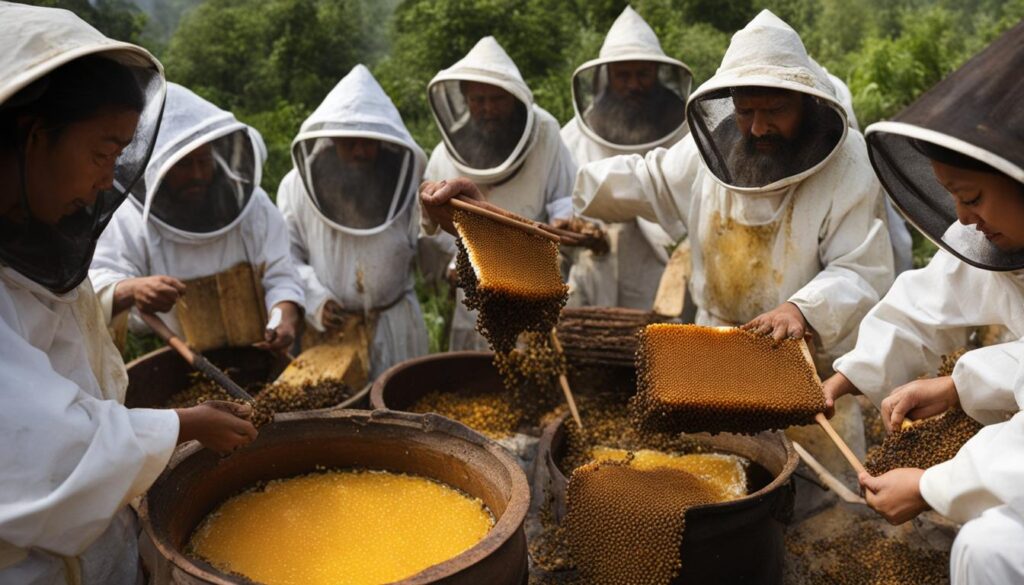
The Ecological Importance of Beeswax
Beeswax is more than just a natural ingredient used in candles and cosmetics. It plays a crucial role in the ecological balance of honeybee colonies and contributes to the overall health of our environment. Understanding the ecological importance of beeswax sheds light on the significance of preserving and supporting honeybee populations.
One of the primary functions of beeswax is its role in the construction of honeycombs. Honeybees use beeswax to create intricate hexagonal cells, providing a stable structure for the hive. These cells serve multiple purposes, including storage for honey, pollen, and even the rearing of brood. The thermal insulation properties of beeswax also help to regulate the internal temperature of the hive, ensuring a suitable environment for the colony’s survival.
Furthermore, beeswax contributes to the productivity and efficiency of honeybee colonies. The construction of honeycombs with beeswax allows honeybees to maximize their food storage capacity and optimize their foraging activities. This, in turn, supports the pollination of flowering plants, leading to increased biodiversity and the sustainable growth of ecosystems.
| Ecological Role | Function |
|---|---|
| Structural Support | Provides stability for honeycombs and the hive |
| Storage Unit | Stores honey, pollen, and brood |
| Thermal Insulation | Helps regulate internal hive temperature |
| Pollination Assistance | Supports honeybee foraging and plant pollination |
The ecological role of beeswax cannot be underestimated. It is essential for the sustainability of honeybee colonies, which, in turn, have a profound impact on our food production and ecosystem health. By understanding and appreciating the ecological importance of beeswax, we can take proactive steps to protect and support honeybees, ensuring the preservation of these vital pollinators for future generations.
Conclusion
In conclusion, the digestibility of beeswax by the human body is limited. While beeswax is primarily composed of esters, fatty acids, and hydrocarbons, it is not easily broken down by digestive enzymes. Therefore, it is considered to have low digestibility in humans. However, consuming beeswax in moderate amounts is generally safe and unlikely to cause harmful effects.
Individual variations in digestion may exist, and some individuals may experience digestive discomfort such as bloating or indigestion when consuming large amounts of beeswax. It is important to listen to your body’s response and consume beeswax in moderation.
Beeswax also has other uses and benefits beyond digestion. It is commonly used in traditional medicine and apitherapy for its potential therapeutic effects. Additionally, beeswax plays a crucial role in the ecological context of honeybee colonies, providing structural support for honeycombs and thermal insulation for hives.
FAQ
Can beeswax be digested by humans?
Beeswax has low digestibility in humans and is not easily broken down by digestive enzymes.
Is consuming beeswax safe?
Consuming beeswax is generally safe, but large amounts may cause digestive discomfort. It is recommended to consume beeswax in moderation.
How is beeswax eliminated from the body?
After ingestion, beeswax passes through the digestive system and is eliminated through bowel movements without significant breakdown or absorption.
Does beeswax provide direct health benefits through digestion?
Beeswax itself does not provide direct health benefits through digestion, but it may be used in combination with other beneficial substances in products.
What are the potential health benefits of consuming beeswax?
Consuming beeswax in combination with other bee products like honey or propolis may have potential antimicrobial and anti-inflammatory effects.
How is beeswax used in traditional medicine and apitherapy?
Beeswax is sometimes used topically in traditional medicine for moisturizing and wound-healing properties. In apitherapy, it may be used in combination with other bee products for potential therapeutic effects, under professional guidance.
What is the ecological importance of beeswax?
Beeswax plays a vital role in the honeybee colony, providing structural support for the hive, thermal insulation, and storage for honey and pollen.

